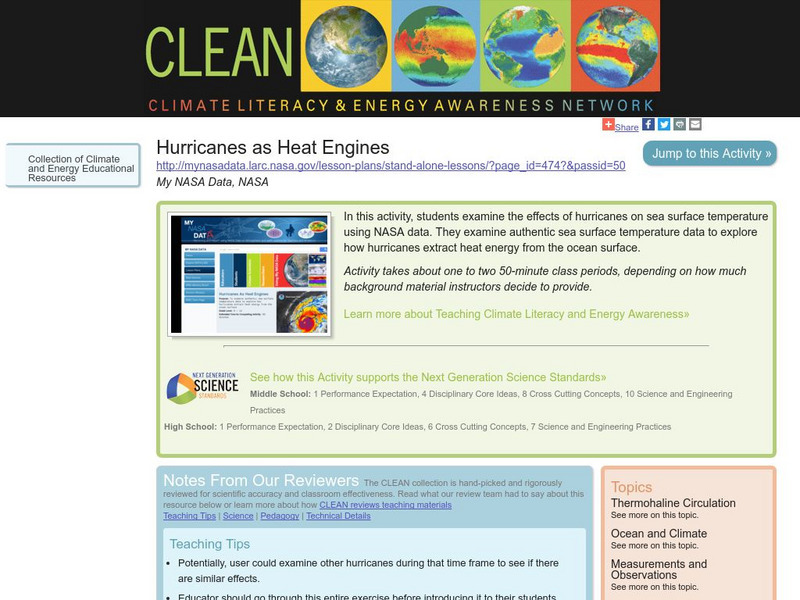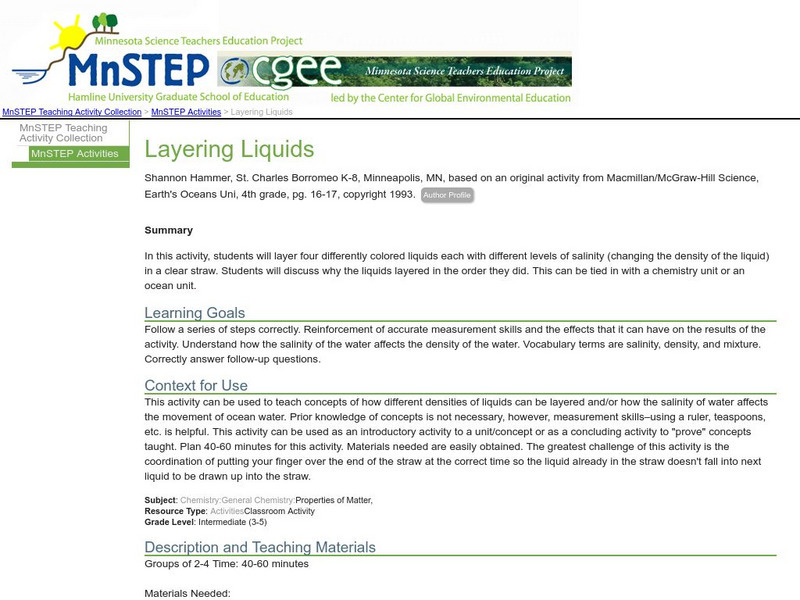Scholastic
Scholastic: Ocean Life
Good starting point for researching ocean life. Find general information, research-topic ideas, a glossary of important terms and people, and numerous links to related sites.
American Geosciences Institute
American Geosciences Institute: Earth Science Week: Sea and Ice Salinity
Students investigate the effects of salinity on the formation of sea ice, and whether salt water freezes more quickly or more slowly than fresh water.
Climate Literacy
Clean: Hurricanes as Heat Engines
In this activity, students examine the effects of hurricanes on sea surface temperature using NASA data. They examine authentic sea surface temperature data to explore how hurricanes extract heat energy from the ocean surface.
Science Education Resource Center at Carleton College
Serc: How Does the Temperature of the Great Lakes Change Over Time?
This activity allows students to use water surface temperature, bathymetric data, and weather data to look at trends in the water temperature of the Great Lakes.
Other
K 3 Learning Pages: Tsunami Disaster
This site features several links to tsunami relief sites. Students and teachers can access information about the tsunami relief efforts through these resources.
Woods Hole Oceanographic Institution
Woods Hole Oceanography Institute: Current Patterns
This simple demonstration will help students understand how air currents and water currents can distribute substances through different environments.
Science Education Resource Center at Carleton College
Serc: Layering Liquids
A lab activity to show students how different densities of liquid layer on top of each other by using four different colored liquids that contain different levels of salinity. This activity can also be used in an ocean unit where...
The Franklin Institute
The Franklin Institute: Treasures at Sea
Learn about ocean systems and habitats. Lots of reading, writing, games, and interactive activities. Colorful and fun.
ClassFlow
Class Flow: Ocean Life
[Free Registration/Login Required] This flipchart is a multi-subject themed primary unit around the concept of oceans. Reading, Math, Science and Social Studies activities revolve around an ocean theme. In Part 5, students work on...
Science4Fun
Science4 Fun: Tsunamis
Learn the causes of tsunamis, what happens during one, where they appear, and survival tips.
PBS
Pbs Learning Media: Coastal Geological Processes
This interactive resource adapted from the National Park Service describes the many forces that affect shorelines, including tides, weathering, erosion, and deposition. Includes background reading handout and discussion questions.
Other
Abc News: Talking to Kids About the Tsunami Tragedy
How can you begin to talk to your kids about the Tsunami tragedy? This site offers insight on how to deal with this difficult topic.








